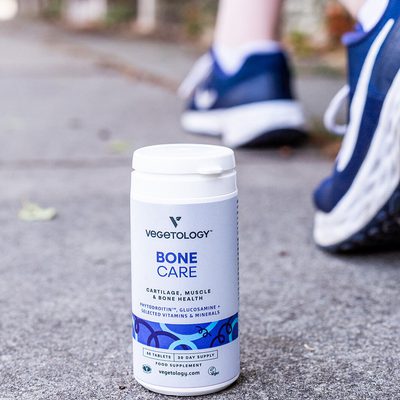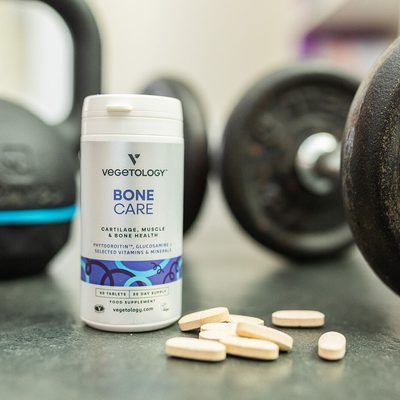
Vitamin K2 is finally getting the attention it deserves—and for good reason. While calcium and vitamin D are household names in bone care, vitamin K2 is the missing link that helps them work properly. Without it, even the best bone health routine can fall short. So, what makes vitamin K2 such a game-changer?
The vitamin you didn’t know you needed
When scientists discovered vitamin K back in 1929, they celebrated its role in blood clotting—the “K” comes from the German Koagulation. For decades, that was thought to be its only function.
But research later revealed that vitamin K has a second form—vitamin K2—that plays a crucial role in maintaining healthy bones and a strong heart. This discovery reshaped how we understand calcium metabolism and long-term bone health.
How vitamin K2 supports strong bones
Think of vitamin K2 as your body’s calcium traffic controller. Calcium is vital for strong bones, but it needs clear direction. Without guidance, calcium can accumulate in the wrong places—such as the arteries—rather than in the skeleton.
Vitamin K2 activates key proteins, including osteocalcin, which binds calcium to bone and teeth, helping to increase bone density and strength. When K2 levels are low, calcium can go astray, leading to weaker bones and a higher risk of arterial calcification.
Simply put, vitamin K2 directs calcium to your bones instead of your arteries, helping to strengthen your skeleton while also supporting cardiovascular health.

The silent challenge of osteoporosis
Osteoporosis—meaning “porous bones”—is a major concern worldwide, especially for postmenopausal women. It develops quietly over many years and dramatically increases the risk of fractures.
Clinical studies have shown that vitamin K2 supplementation can help reduce bone loss and maintain bone density. In one three-year study, women taking 180 micrograms of vitamin K2 daily experienced significantly less age-related bone loss in their spines than those who didn’t supplement.
K2 not only slows the breakdown of bone tissue but also supports the formation of new bone—an essential combination for lifelong bone strength.

The heart – bone connection
The health of your bones and heart are more connected than you might think. Researchers call this the “calcium paradox”—the observation that calcium can sometimes harden arteries instead of strengthening bones.
The famous Rotterdam Study found that participants with the highest vitamin K2 intake were 52% less likely to develop arterial calcification and 57% less likely to die from heart disease. That’s because K2 ensures calcium is deposited where it belongs, promoting both bone density and cardiovascular wellness.
It’s yet another reason why adding a vitamin K2 supplement to your bone care routine can have whole-body benefits.
Not all vitamin K2 is the same
Vitamin K2 comes in two main forms: MK-4 and MK-7. MK-4 acts quickly but leaves the body within hours, while MK-7 stays active for two to three days, maintaining consistent support with a smaller daily dose.
Because of its superior bioavailability and convenience, MK-7 is the preferred form for most people—and it’s the form we use in our Vegetology Bone Care formula.
Where to find vitamin K2 naturally
Vitamin K1, found in leafy greens, supports blood clotting, but K2 is far rarer in everyday foods. The best natural sources include fermented or animal-based foods such as natto (a Japanese fermented soybean dish), aged cheeses like Gouda and Brie, egg yolks, liver, and certain meats.
For those following a plant-based or vegan diet, getting enough K2 through food alone can be challenging. That’s why a plant-based vitamin K2 supplement can make all the difference in maintaining healthy bones.

Who benefits most from vitamin K2
Although everyone can benefit from adequate vitamin K2 intake, certain groups should pay special attention:
Postmenopausal women, who experience faster bone loss
People on plant-based or vegan diets
Adults over 50, whose bone density naturally declines
Anyone already taking calcium or vitamin D supplements
Active individuals who place extra stress on their bones
For all these groups, consistent vitamin K2 intake helps ensure that calcium supports bone strength rather than contributing to calcification elsewhere.

The Vegetology difference
At Vegetology, we include plant-derived vitamin K2 (MK-7) in our Bone Care supplement because the science speaks for itself. Each daily dose provides 37.5 micrograms of highly bioavailable K2, produced through natural bacterial fermentation—the same process that creates K2 in traditional fermented foods like natto.
Our Bone Care formula combines K2 with vitamin D and other key nutrients for comprehensive bone and joint support. It’s 100% plant-friendly, evidence-based, and formulated for optimal absorption.
The bottom line
Vitamin K2 might be the nutrient you’ve never heard of, but your bones and heart know exactly how vital it is. By guiding calcium to where it’s needed most, K2 helps prevent bone loss, strengthens your skeleton, and protects your cardiovascular system.
Whether you’re 25 and building a foundation for the future, 45 and staying active, or 65 and prioritizing mobility, vitamin K2 supplementation is an investment in lifelong strength and independence.
“We include Vitamin K2 in Bone Care for its proven benefits to bones and joints.”
Ready to give your skeleton the support it deserves? Explore Vegetology Bone Care—a complete, plant-based vitamin K2 supplement designed to keep your bones strong and your body moving freely.